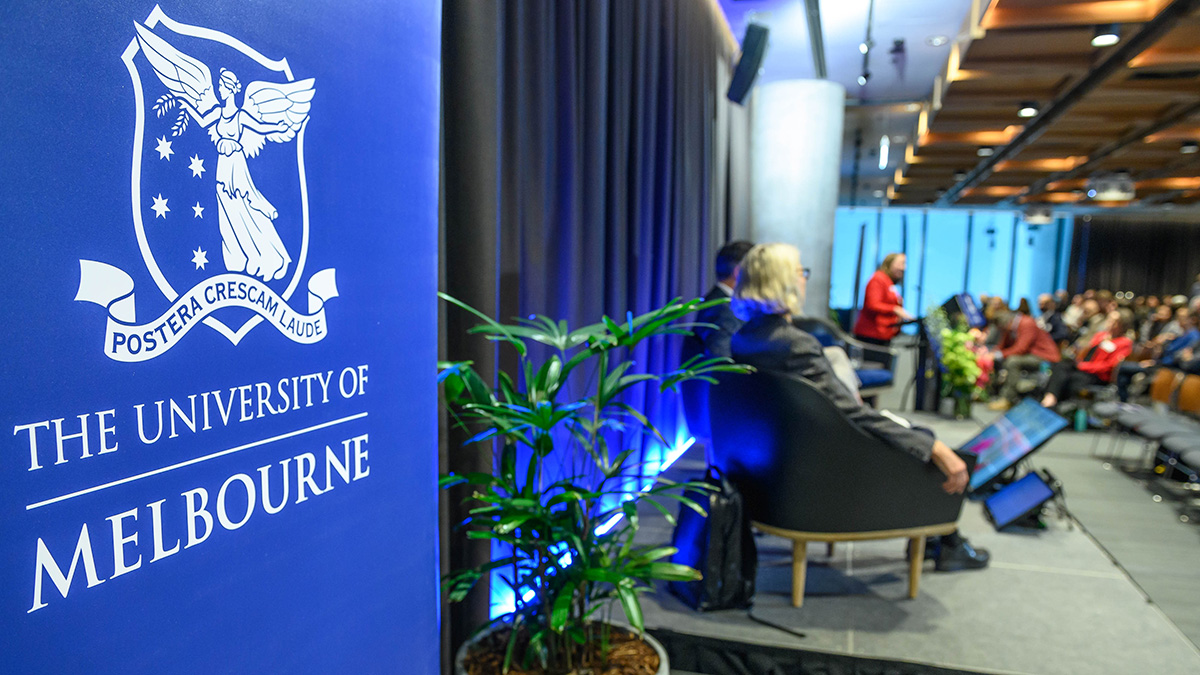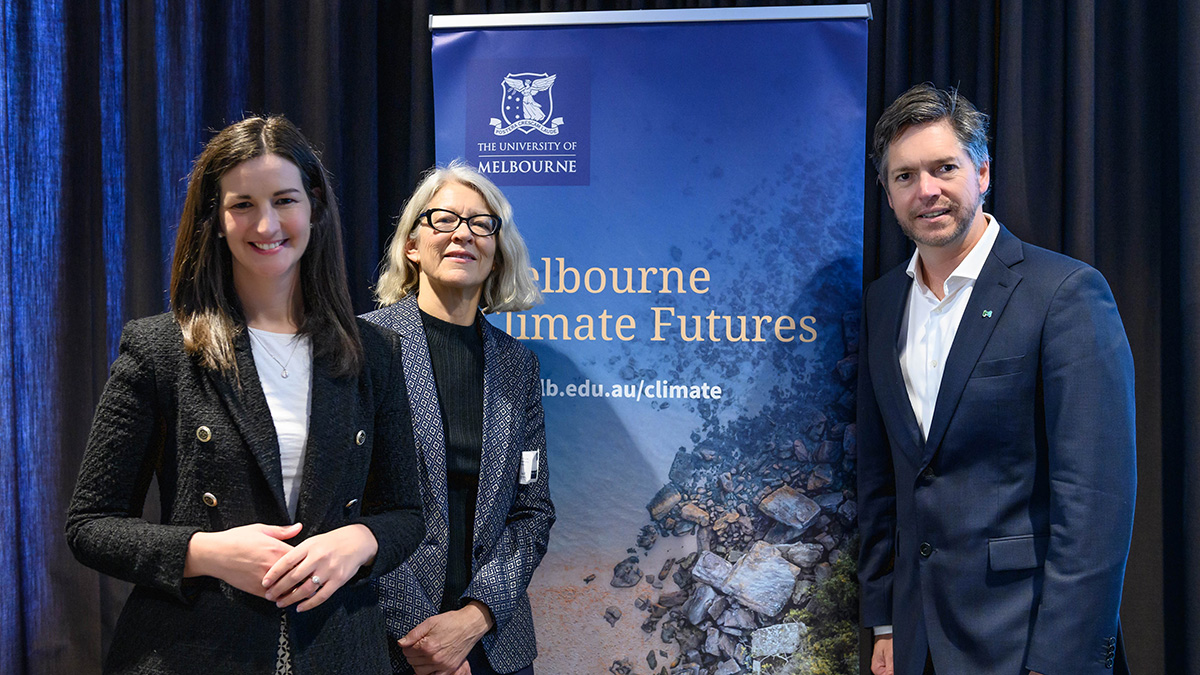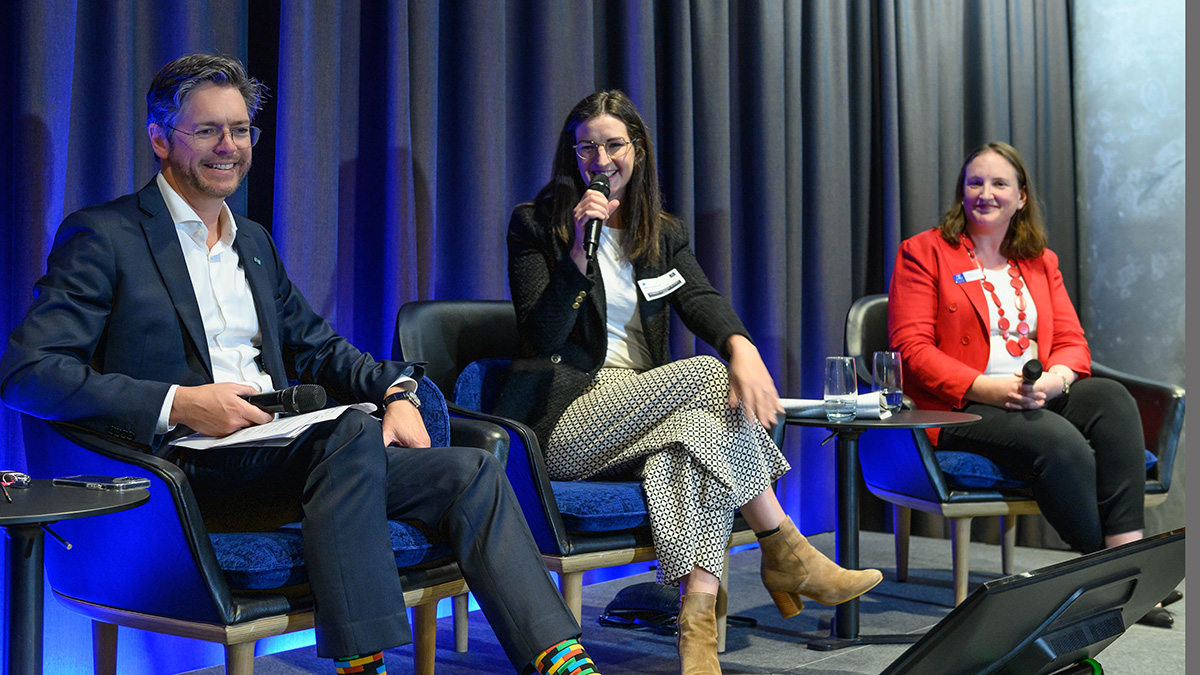Australia needs courageous leadership to resolve conflicting national needs while ensuring a swift transition to a positive climate future. The 2023 Climate Futures Summit united University of Melbourne experts, students and government and industry partners for a day of unflinching discussion on the transformative actions needed to solve the climate crisis.
The world needs urgent, transformative climate action. In 2023, that’s beyond dispute.
We need more than technological solutions. Our future relies on interdisciplinary collaboration across industry, government and research.
But it won’t be easy. The policy and infrastructure changes needed for a positive climate future come with difficult trade-offs.
The 2023 Climate Futures Summit united experts, students and government and industry partners for a day of idea sharing and unflinching discussion. Hybrid in-person and online multidisciplinary panels discussed:
- The connections between biodiversity, oceans and climate, and how effective solutions for each can create an impact greater than the sum of its parts
- How we’ll pay for the climate crisis, how geography factors in and what an effective climate finance framework looks like
- The human cost of a warming world, how that’s distributed across demographics, and how we’ll protect physical and mental health
- Envisioning Australia and the region’s energy future as we responsibly and justly transition to green energy.
Watch the 2023 Climate Futures Summit
A key theme that emerged during networking conversations and panel discussions was the need for determined, courageous leadership to drive climate adaptation and mitigation.

‘Leadership, government and climate governance’ convened a panel with experience across local, state and federal governments and climate litigation. They discussed how leaders may resolve conflicting national needs while ensuring a swift transition to a positive climate future.
Why is climate change a difficult political problem?
Climate-related decisions and their effects are often not connected geographically, explained Ellen Sandell, Deputy Leader for the Victorian Greens.
Australian emissions won’t only cause climate change in Australia. And the effects of climate-related decisions are rarely instant.
In Sandell’s experience, governments have preferred incremental, methodical change. They prefer to solve problems with quick, visible outcomes to announce to their electorate.
“Politicians are in the business of being popular,” she said.

To tackle climate change, you need courageous leaders willing to tackle a vast, interconnected problem without quick wins.
Another political barrier to climate action is access to balanced information about climate change. Representatives from coal, gas and logging industries often have the ears of Australian state and federal policymakers.
Balancing that information with community voices, research and evidence is key to pushing government into climate action, said leading international environmental and climate law expert Professor Jacqueline Peel.
How communities can have their voices heard on climate change
Climate litigation is a relatively new avenue young people, Indigenous peoples and community groups are taking to circumvent ordinary government mechanisms.
The courts can be conservative, but they’re independent and not embedded in the short-term electoral cycles of government.
“We’re seeing quite radical, courageous decisions coming from some of our courts here in Australia and internationally,” Professor Peel said.

Local governments are another option for communities to pursue climate action. Local governments have less power, but they’re more responsive to community will.
“We can be far more nimble and agile in our response to climate policy and climate challenges,” said Nicholas Reece, Deputy Lord Mayor of the City of Melbourne. Reece has worked across all three levels of government in his career.
Local governments can also make tailored climate adaptation policies in response to impacts that are already being felt by communities, like rising sea levels and extreme heat events.
“There’s no problem too small for a local councillor,” Reece said.
Bringing key climate decisions closer to the people they will affect could make more progressive climate policies.
Seeking courageous climate leaders
Leadership from within the community – like the extinction rebellion – can also create political pain that will motivate governments at higher levels.
But the panel agreed that democratically elected governments can make stronger climate policies than they previously could, as it’s becoming more acceptable to their constituents. It’s time for governments to make courageous decisions.
“We’ve just lived through a pandemic where we saw incredible changes and shifts to social norms and to what was possible for democratic leaders to do and to decide. And by and large we accepted it because we understood why it was necessary,” said Sandell.
And if the government’s decisions seem unsatisfactory, why not consider a career change to politics?
“Decisions get made by people who turn up. If you want to see change happen, you’ve got to turn up,” Reece said.
The Climate Futures Summit will be back in 2024.
Melbourne Climate Futures
Melbourne Climate Futures creates a portal to share ideas and collaborate on real action. It empowers the next generation of climate activists.
The initiative is committed to leading national, regional and global communities to a sustainable, safe, fair and equitable climate future.
First published on 2 November 2023.
Share this article
Keep reading
-
Melbourne Climate Futures
Melbourne Climate Futures builds on decades of research across areas such as climate change impacts in the Pacific, energy futures, bushfire resilience, and sustainable cities, as well as innovative approaches to policy and law.
-
Environmental Research Hub
Discovery and impact by our people and partners to create a sustainable future.
-
Why partner with us
Partner with the University of Melbourne. Join a community where the world’s best minds help solve the biggest global challenges of our time.
-
Collaborate with us
Explore some of the many ways you can partner with us to help your organisation excel.